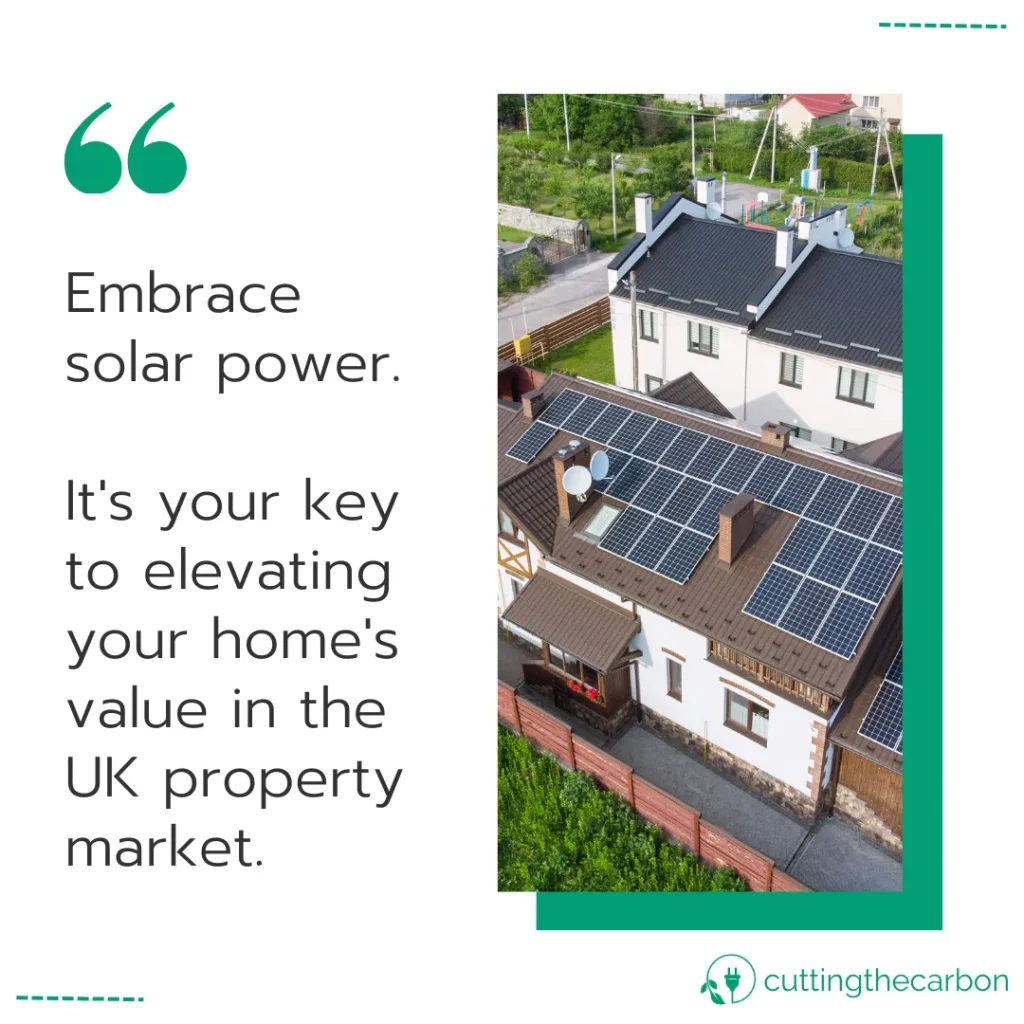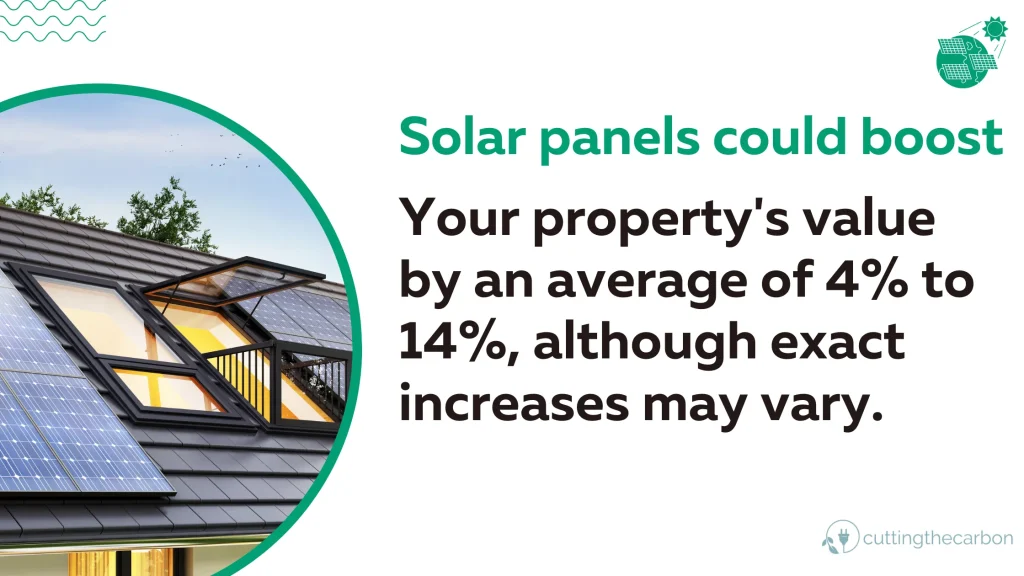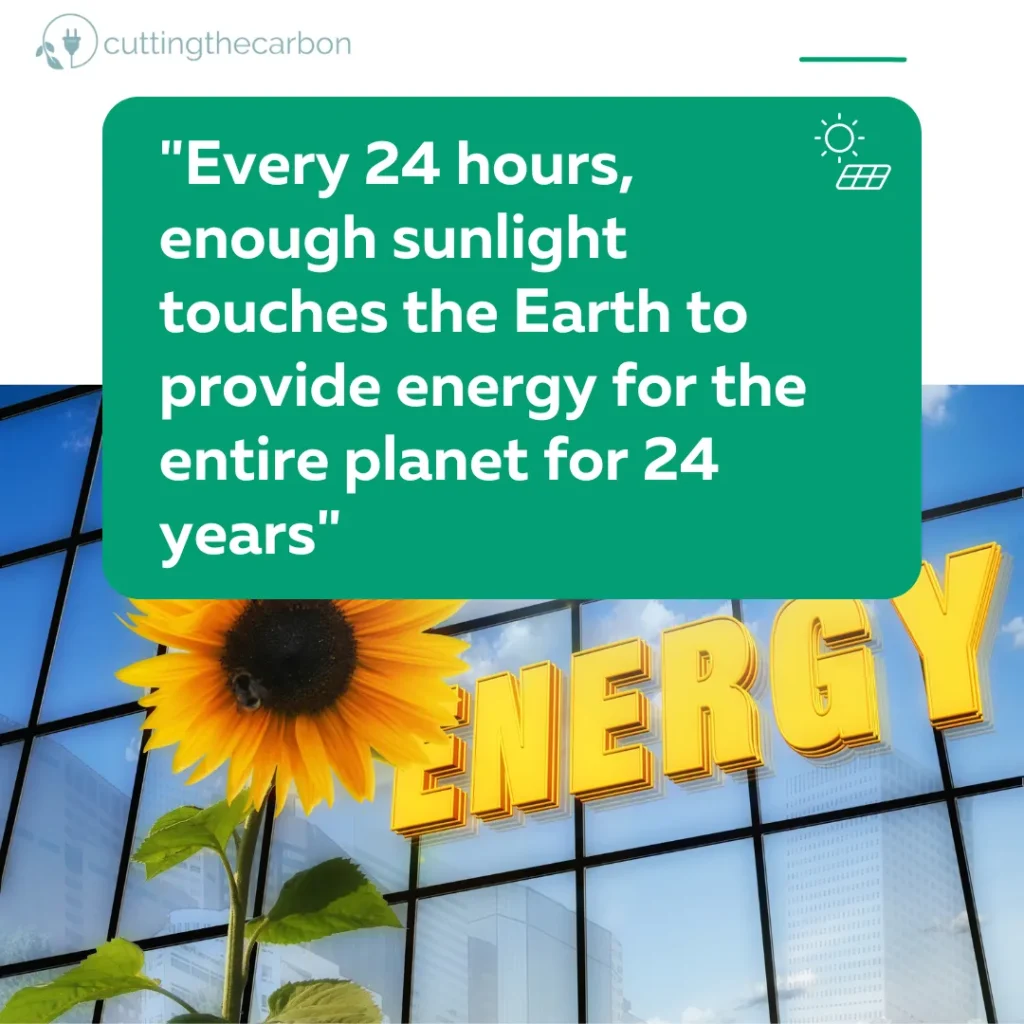Do solar panels increase home value? It’s a question that stumps many UK homeowners.
In today’s climate of escalating energy outlay and heightened concern for sustainability, it appears to make sense to consider whether solar panels can add value to a property. But what about the financial implications?
The truth is, installing solar panels can be quite an investment upfront. Yet, there’s more to consider than just the initial cost.
You see, not only do these green powerhouses help you save on your electricity bills over time, but they also have the potential to boost your property’s worth significantly.

Is there a correlation between solar panel installations and increased home prices in the United Kingdom?
Indeed, there is. Properties with photovoltaic solar panel systems are in higher demand due to potential energy savings, leading to a higher market value than properties without solar panels.
The Role Solar Panels Play in the Green Energy Industry
Solar panels are becoming increasingly central to the green energy industry when considering our journey towards a sustainable future. Solar panels are not only pioneering, but they’re transforming the way we power our homes and businesses.
Solar panels’ role extends beyond providing renewable energy. They also serve as an excellent financial investment by significantly reducing high electricity bills for homeowners across the UK. This is particularly beneficial given the ever-increasing costs of traditional grid-supplied power.
A report from The Guardian indicates that solar panel prices have been falling around 10% annually since the ’80s – making them more accessible than ever before.
Understanding How Solar Panels Work
You might be wondering: how do these devices work? It’s all about photovoltaic cells, which absorb sunlight and convert it into electrical energy (DC). An inverter then transforms this DC output into AC suitable for use within residential properties.
This process offers benefits beyond producing clean energy alone – when combined with home batteries or other home-energy storage systems, excess generated power can be stored up for later use during sunless periods such as night-time or cloudy days.

How Solar Panels Increase Home Value in the UK
Introducing solar panels to a property is not merely an eco-friendly move. It’s also a smart financial decision that can significantly boost your home value.
A research study in California, for instance, discovered that homes with installed solar panel systems sold at higher prices compared to those without such features. This data suggests that having properly functioning solar panels could potentially increase the value of properties by up to 4.1%.
Public Opinion on Solar Panels
In today’s society, where sustainability and green energy are high priorities, public opinion towards residential solar installation has seen positive shifts.
According to a recent report, approximately 80% of potential homeowners consider energy-efficient features like average solar panel installations crucial when selecting their next home.
These findings indicate growing recognition amongst buyers about the long-term savings benefits associated with owning a renewable-energy-powered house – hence driving demand and increasing property values further.
Factors Influencing How Much Value Solar Panels Add
The value that solar panels add to a property isn’t as straightforward as you might think. Several factors are at play, such as the system’s output, the panels’ age, and their location on your property.
Considering Different Property Types
Different types of properties can experience varying impacts from installing solar panels. For example, detached houses with larger roofs could benefit more than terraced homes because they have more space for an average solar panel installation.
In contrast, flats or apartments in multi-storey buildings may face challenges due to less roof space and potential issues securing installation permission. But not all doom and gloom – community solar projects could provide innovative solutions.
Listed buildings or those within conservation areas also need special consideration before proceeding with any form of renewable energy installation like a residential solar installation – local planning guidelines should be consulted first.
The System Output
A crucial factor affecting how much value is added by properly functioning 4kW systems (considered standard size for residential use) is essentially how much electricity they generate; higher outputs equate to greater savings over time on high electricity rates, which enhances the appeal to prospective buyers. (Energy Saving Trust)
This surplus energy generated by these generally cheaper but efficient systems can potentially be sold back into the grid through schemes such as Smart Export Guarantee (SEG), providing additional income and enhancing a property’s attractiveness even further.
Some Helpful Data And Statistics Relating to Solar Energy In The UK
| Key Points | Explanation |
|---|---|
| Solar Energy Adoption in the UK | The UK has seen a surge in the adoption of solar energy, making it a common choice for residential energy production. |
| Expense of Solar Panel Installation | As per data from 2022, the typical cost of installing solar panels in a UK household is slightly less than £6,000 (£5,940). |
| Financial Benefits of Solar Energy | Solar panels can significantly cut down your electricity bills. For instance, a 4kWp system in the southern part of England can help residents save approximately £330 annually. |
| Handling of Surplus Power | Typically, UK homes with solar panels utilise only a quarter of the electricity they generate. The remaining energy is sent back to the National Grid, contributing to the power supply of other homes and businesses. |
| Solar Panels and Aesthetics | Solar PV panels can generate electricity for household use and power electric vehicles, making them a versatile energy solution. |
| Impact on Property Sale | The presence of solar panels doesn’t devalue a property. In fact, they are seen as an added feature that can increase a property’s value due to the energy cost savings they provide. |
| Compatibility with Electric Vehicles | Solar PV panels can generate electricity for household use and for powering electric vehicles, making them a versatile energy solution. |
| Final Thoughts on Solar Panels and Property Value | Solar panels can enhance your property’s value and appeal to potential buyers. They represent a long-term investment that homeowners need to plan for. |
Potential Downsides: Increasing Potential Repair Costs
Solar panel systems last up to two decades or more without significant problems making them excellent financial investments despite being costly initially. However, older ones nearing end-of-life expectancy present increasing potential repair costs, which some buyers might find offputting.
This underscores why considering ongoing maintenance and solar panel cleaning when investing in a green technology solution like this one is important.
Maintaining transparency about these aspects during sale negotiations will help ensure full benefits are reaped while avoiding surprises down the line.
It’s clear the role played is invaluable in helping reduce ever-increasing costs associated with traditional sources of power, thus worth every penny spent.
While solar panels can boost your property’s value, the impact isn’t black and white. Factors like system output, panel age, location on your property and building type all play a part. But with increased savings over time and possible income from surplus energy sales, it’s clear that they’re more than just hot air.

The Future of Solar Powered Homes
Looking ahead, we can anticipate positive progression in the sustainable energy sector that could make solar-powered homes more desirable and productive. One key development is home-energy storage using home batteries.
Home-Energy Storage Using Home Batteries
A rising trend among UK householders keen to maximise renewable energy usage involves installing home batteries. These devices store the surplus electricity your solar panels generate during peak sunlight hours for use when sunshine is sparse.
This cuts down on grid-supplied electricity and provides a backup power source during outages. As battery technology advances, these systems become increasingly cost-effective for an average householder grappling with ever-increasing costs.
Beyond just savings, though, they offer additional benefits such as incentives or discounts offered by certain utility companies who value customers with installed home batteries due to their ability to balance demand on the electrical grid.
Advancements in Solar Technology
In addition to storage solutions, there have been significant leaps forward within solar panel technology, making it easier for homeowners like you and me to generate our own electricity efficiently.
A prime example would be roof-integrated 4kwp solar array systems, which blend seamlessly into a building’s structure rather than being mounted atop existing roofing materials like traditional installations do.
Rather than standing out visually, these integrated systems merge aesthetically, giving them visual advantages over conventional setups while maintaining high-efficiency levels typical of modern photovoltaic cells.
Their sleek design eliminates common issues associated with rooftop-mounted panels, such as wind resistance and shading from nearby structures or trees – factors that can significantly impact system performance over time.
Solar-powered homes are the future, with advancements in green energy making them increasingly efficient and appealing. Home batteries store surplus solar-generated electricity for use during less sunny periods, reducing grid-supply reliance and providing a backup power source.
Making an Informed Decision about Solar Panel Installation
When it comes to solar panel installation, the first thing that might come to mind is the cost. Yes, installing a costly solar panel system can initially seem like quite an investment.
While there are costs associated with the assembly of such systems, these could be counterbalanced by long-term savings on energy bills and an increase in property worth.
This makes residential solar installations environmentally friendly and financially savvy for homeowners across the UK.
We suggest your average solar panel system should pay for itself within 7-8 years. After this period of recouping initial outlays through reduced electricity rates and potential income from feed-in tariff schemes or smart export guarantees (SEG), you’re essentially looking at free power generation.
Factors Influencing Cost and Return on Investment
Surely prices must vary when discussing something as complex as a renewable energy setup?
Absolutely correct. Factors including size of installation required, quality of panels chosen – even geographical location play significant roles in determining overall expenditure associated with generally cheaper versus more expensive options.
In addition to upfront charges, though, are considerations around ongoing maintenance – particularly increasing potential repair costs, which rise over time due to wear and tear.
But don’t let this deter you; many suppliers offer extended warranties covering repairs or replacements beyond standard warranty periods – another point worth considering during decision-making.
Evaluating Potential Savings
Beyond immediate financial implications lies perhaps the most compelling argument favouring a switch towards greener alternatives: substantial reductions seen regarding high electricity rates paid by households throughout the country once they’ve adopted properly functioning photovoltaic cells into their homes’ infrastructure.
In fact, potential savings resulting from lower utility bill payments and the likelihood of adding considerable resale value to properties make investing in technologies like rooftop PV systems a sound proposition.
While the initial outlay for solar panels can be steep, it’s a savvy investment that pays off in 7-8 years. With potential savings on energy bills and increased property value, you’re essentially generating free power. Factor in extended warranties covering wear-and-tear costs, and going green is even brighter.
Do Solar Panels Increase Home Value? Final Thoughts
Solar panels are a key component in the drive towards green energy, providing cost savings and sustainability benefits. Their role in reducing electricity bills and promoting sustainability cannot be understated.
Solar panel installation may seem costly upfront but remember; it’s an investment that pays off in multiple ways. There’s much on offer from slashing your electricity bills to government incentives for renewable energy adoption.
Your geographical location plays a part, too; certain areas can harness more sunlight, thus generating more power. Evidence suggests that homes with solar panels fetch higher prices than those without – up to 4.1% higher!
This trend seems set to continue as public opinion favours energy-efficient homes. And yes, do solar panels increase home value? Absolutely.
But what about different property types or older systems needing repairs? These factors need careful consideration.
The future of green technology is exciting, with advancements like roof-integrated 4kwp solar arrays and home-energy storage using batteries promising even greater savings.
Before you make any decisions, though, weigh all these aspects carefully.
At Cuttingthecarbon we specialise in finding the right green technology solutions for you – installing efficient heat pumps or helping you switch to electric vehicle charging stations alongside your new shiny solar array.
FAQs in Relation to Do Solar Panels Increase Home Value
Do solar panels add value to a property?
Yes, properly functioning solar panels can increase a home’s value by up to 4.1% in the UK.
Do solar panels make houses more saleable?
Absolutely. With 80% of buyers considering energy-efficient features important, homes with solar installations are generally more appealing.
How many solar panels do I need for a 3 bedroom house UK?
An average three-bedroom house in the UK typically requires around 12-16 high-efficiency solar panels for optimal energy production.
Are solar panels a good investment in the UK?
Solar panel systems represent an excellent financial investment due to their ability to increase property values and reduce ongoing energy costs.

